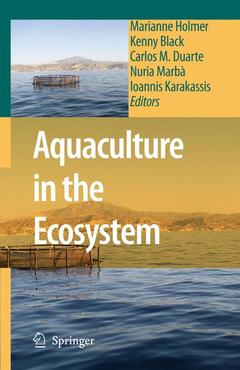Aquaculture in the Ecosystem, Softcover reprint of hardcover 1st ed. 2008
Langue : Anglais
Coordonnateurs : Holmer Marianne, Black Kenny, Duarte Carlos M., Marbà Nuria, Karakassis Ioannis

Aquaculture in the Ecosystem ? An Introduction The growth of Aquaculture and its future role as a food supplier to human society has environmental, social and economic limitations, affecting marine ecosystems and socio-economic scales from local to global. These are close links with human health requirements and societal needs for various goods and services provided by marine ecosystems. This book shows this broad spectrum of dependencies of the future growth of aquaculture and highlights both relevant problems and expectations. Compensating for stagnant wild capture fisheries and the increasing demand for marine products, marine aquaculture is one of the fastest growing industries in the world, comparable to the computer technology industry (Chapters 9 and 10). The demand for marine products is controlled by a complexity of factors in our society, not least the increasing human population and the increasing global affluence that allows the consumer to buy higher priced marine products such as salmon, tuna and shellfish (Chapter 9). The populations of several of these top-carnivore species are seriously compromised and it will be impossible in the future to maintain wild c- tures at the level of consumer demand. In less affluent areas including SE Asia and Africa, aquaculture for both domestic consumption and export has major nutritional and economic benefits. The production of fish in aquaculture is thus expected to increase under the assumption that the bottlenecks for expansion can be overcome (Chapter 10).
Fish Farm Wastes in the Ecosystem.- Monitoring of Environmental Impacts of Marine Aquaculture.- Aquaculture and Coastal Space Management in Europe: An Ecological Perspective.- Detrimental Genetic Effects of Interactions Between Reared Strains and Wild Populations of Marine and Anadromous Fish and Invertebrate Species.- Non-Native Aquaculture Species Releases: Implications for Aquatic Ecosystems.- Safe and Nutritious Aquaculture Produce: Benefits and Risks of Alternative Sustainable Aquafeeds.- NGO Approaches to Minimizing the Impacts of Aquaculture: A Review.- Aquaculture in the Coastal Zone: Pressures, Interactions and Externalities.- Future Trends in Aquaculture: Productivity Growth and Increased Production.- Status and Future Perspectives of Marine Aquaculture.
First interdisciplinary approach to aquaculture management Provides future perspectives based on all aspects of the aquaculture production (environmental, social and economically) Provides scientific state of art based on numerous recent research projects Global perspectives on aquaculture Aquaculture as an integrated part of the ecosystem
Date de parution : 10-2010
Ouvrage de 326 p.
15.5x23.5 cm
Date de parution : 01-2008
Ouvrage de 326 p.
15.5x23.5 cm
Thèmes d’Aquaculture in the Ecosystem :
© 2024 LAVOISIER S.A.S.



